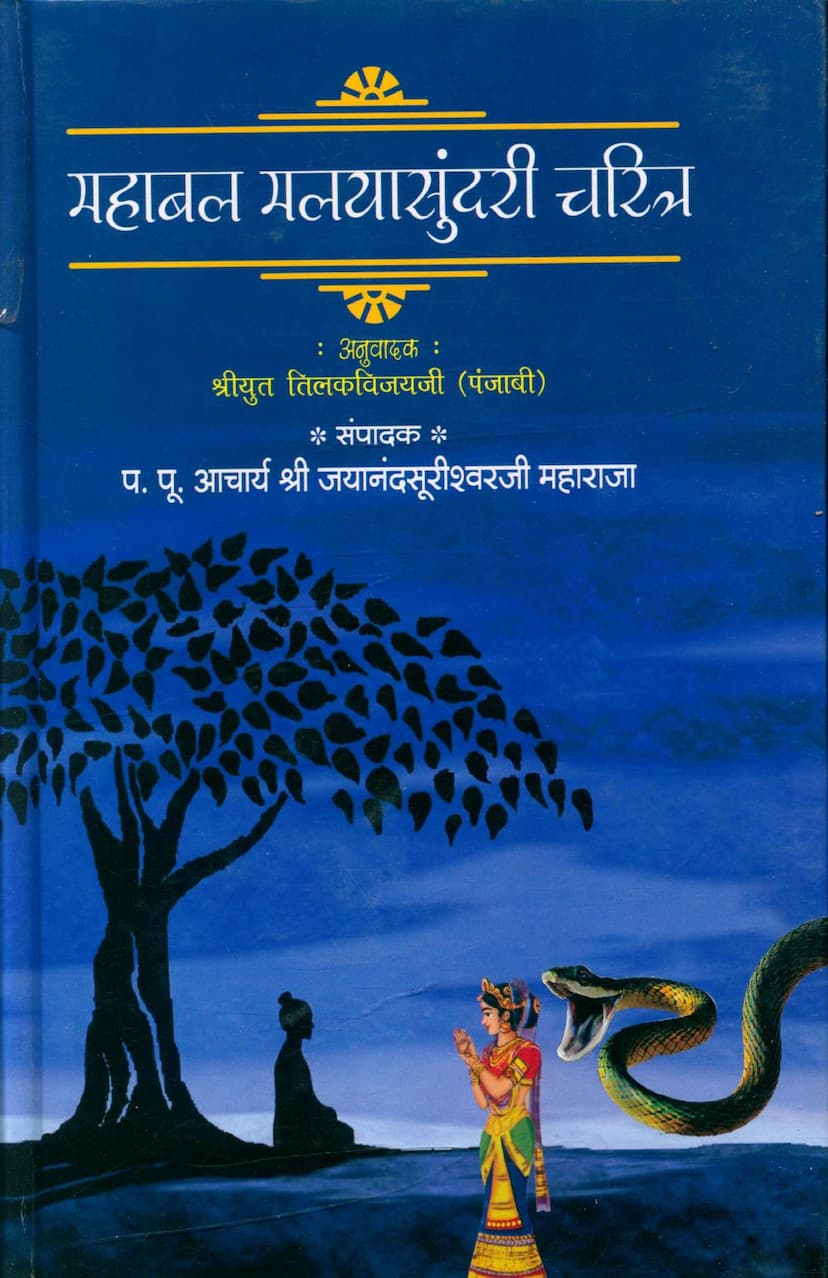Mahabal Malayasundari Charitra
Added to library: September 2, 2025

Summary
Here's a comprehensive summary of the Jain text "Mahabal Malayasundari Charitra" based on the provided text, aiming to capture the essence of the narrative and its teachings:
Mahabal Malayasundari Charitra: A Summary
The "Mahabal Malayasundari Charitra" (The Saga of Mahabal and Malayasundari) is a Jain narrative presented in Hindi, translated by Tilakvijayji (Punjabi) and edited by Acharya Shri Jayanandsurishwarji Maharaj. The text recounts a series of dramatic events involving royalty, betrayal, hardship, spiritual growth, and eventual liberation, emphasizing Jain principles of karma, righteousness, and perseverance.
The story unfolds with the king of Chandravati, King Veeradhaval, who is deeply concerned about his lack of progeny. His wife, Queen Champakamala, shares his sorrow. Meanwhile, the narrative introduces the merchant Lobhakar and his brother Lobhanandi, who discover the secret of turning iron into gold from a mysterious youth's alchemical flask. Their greed leads them to betray the youth, resulting in them being magically paralyzed.
The tale then introduces Gunavarma, Lobhakar's son, a virtuous young man who helps Vijayachandra, the prince of Kushavardhanpur. Vijayachandra, after being wronged by his own brother, learns powerful mystic arts. He uses these to defeat a demonic being that had caused the desolation of his city and rescued his sister-in-law, Vijaya. This part of the story highlights the consequences of actions and the power of righteousness.
Later, the story shifts to the king of Gandhara, King Soorpal, and his son Mahabal. Mahabal, secretly visiting Chandravati, encounters Malayasundari, the beautiful princess of Chandravati and King Veeradhaval's daughter. They fall in love, but their union is fraught with challenges, including Malayasundari's jealous stepmother, Kanakavati, and her plot to separate them. Mahabal, through his intelligence and the use of magical amulets, navigates these dangers, even transforming himself and Malayasundari to escape perilous situations. A key event involves Mahabal's clever use of a magical amulet that allows him to change his form, enabling him to outwit Kanakavati and the king of Sagar Tilaka, King Kandarp, who desires Malayasundari.
Malayasundari faces extreme hardship, including abandonment, being sold, and suffering severe physical torment, even being thrown into a well and later attacked by a bird of prey. Through immense fortitude and the grace of Jain principles, she survives and eventually reunites with Mahabal, who had also undergone severe trials, including imprisonment and a miraculous escape. Their reunion is aided by a divine intervention from a Vayantar Dev (a type of celestial being) who had been influenced by Mahabal's past good deeds.
The narrative then intricately weaves in the concept of karma and past lives. The story of Mahabal and Malayasundari's relationship is revealed to be a continuation of their bond from past lives, where their actions in those lives determined their present circumstances. This includes the stories of Priy Mitra and his wives Rudra and Bhadra, and the sage Madanpriya, explaining the origins of their present-day suffering and love. The narrative emphasizes that even seemingly negative events stem from past actions, and through righteous conduct, one can overcome them.
King Veeradhaval's deep desire for children is fulfilled through the blessings of a celestial being, leading to the birth of Mahabal and Malayasundari. Their subsequent adventures, including their separation and reunion, are driven by the unfolding of their karma.
The story highlights the importance of dharma (righteousness) in overcoming adversity. Mahabal's unwavering adherence to his principles, even in the face of death and extreme hardship, is a central theme. Malayasundari's perseverance and chastity are also crucial.
Ultimately, after a series of trials and the downfall of the wicked characters like Kanakavati and the greedy merchant Balasar, Mahabal, revealed to be Prince Mahabal of Prithvisthanpur, and Malayasundari, are recognized and reunited with their families. Their reunion leads to great rejoicing.
The story culminates in Mahabal and Malayasundari, along with King Veeradhaval and King Soorpal, embracing Vairagya (renunciation) and Sanyam (asceticism), dedicating their lives to spiritual pursuits under the guidance of a wise Kevali (omniscient being). They achieve Nirvana, the ultimate liberation from the cycle of birth and death.
The "Mahabal Malayasundari Charitra" serves as a moral and spiritual guide, illustrating that even through immense suffering, the path of righteousness, truth, and devotion leads to ultimate peace and liberation. It underscores the profound impact of karma and the enduring power of virtue.